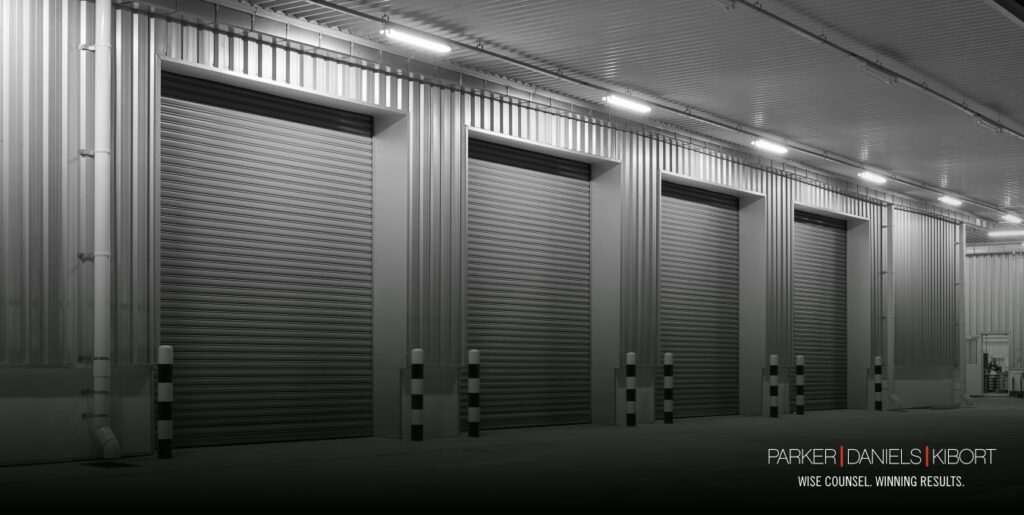
Update on Minnesota’s Self-Storage Act: Navigating Recent Changes and Best Practices for Facility Owners
In a previous blog, we explored the fundamental aspects of the Minnesota Liens on Personal Property in Self-Service Storage Act, Minnesota Statute Sections 514.970 to 514.979 (the “Self-Storage Act”), focusing on its powerful lien and foreclosure processes available to storage facility owners. Since the significant 2021 amendments, we have continued to see practical impacts on how self-storage businesses operate under this legislation, highlighting the importance of staying vigilant and proactive in compliance.
- Evolving Notice Requirements and Enhanced Compliance Needs
One of the most notable changes in the recent amendment involves the expanded notice provisions. The legislature’s revisions have clarified the requirements for notifying tenants (and now their authorized representatives) when a lien is asserted or when access to the storage unit is restricted due to non-payment. However, issues have arisen regarding the sufficiency and methods of these notices. While email remains a preferred method due to its efficiency, owners must ensure they have explicit consent from tenants within the rental agreement, as failure to do so may invalidate the lien notice. We recommend a review of existing lease agreements to confirm they comply with the current statute’s requirements, particularly with the updated provisions on notice format and delivery methods.
- Denial of Access and Retrieval Rights: Avoiding Pitfalls in Default Situations
The expanded rights of tenants (and their authorized representatives) to access and retrieve personal property, even in default, have introduced new complexities. Owners are now required to provide reasonable accommodations for retrieval, which may include scheduling access outside of normal business hours or allowing access to specified items, such as critical medical equipment or legal documents. Failure to accommodate these requests can expose facility owners to potential claims of wrongful denial of access. To mitigate risks, we advise implementing clear internal protocols that align with the amended statute and training staff on handling retrieval requests appropriately.
- Increased Scrutiny on Value Limitation Clauses in Lease Agreements
While the Self-Storage Act allows for contractual value limitations on stored goods (with a statutory minimum of $1,000), recent case law suggests that courts are scrutinizing these clauses more closely. In light of this, it may be prudent for facility owners to reassess the value limitations set in their agreements, balancing the need for risk management against the potential for judicial pushback. Increasing the limit to a reasonable amount—higher than the statutory floor—can provide additional protection and reduce the likelihood of the clause being challenged as unconscionable.
- Navigating the Sale of Titled Vehicles: Updates and Best Practices
The sale of titled vehicles remains one of the more cumbersome aspects of enforcing a lien under the Self-Storage Act. Despite the streamlined procedures introduced in recent amendments, navigating the requirements for lien sales involving vehicles (such as obtaining title transfers and complying with state-specific DMV regulations) can still present significant challenges. Facility owners should be aware of the specific documentation requirements and timelines involved, as failure to comply can result in delays or potential legal disputes. Our firm has developed a comprehensive checklist to help streamline this process, ensuring compliance and minimizing disruptions.
- Implications for Multi-State Operators: Harmonizing Compliance Across Jurisdictions
For self-storage operators with facilities in multiple states, it is crucial to recognize the variances in lien laws and ensure compliance across all jurisdictions. While Minnesota’s Self-Storage Act provides robust protections for owners, neighboring states like Wisconsin, Iowa, and North Dakota have their own statutory frameworks that may differ significantly in terms of notice requirements, lien enforcement procedures, and permissible recovery actions. We offer specialized counsel to help clients harmonize their operational policies and lease agreements across state lines, reducing the risk of non-compliance and costly litigation.
Looking Ahead: Legislative Trends and Potential Future Amendments
The self-storage industry has seen rapid growth, prompting increased regulatory attention. We anticipate further legislative developments aimed at balancing the interests of facility owners with enhanced consumer protections, particularly in areas related to data privacy for tenant records, digital communications, and fair value assessments. Staying ahead of these changes will be key for owners seeking to maintain a competitive edge while minimizing legal exposure.
Parker Daniels Kibort: Your Partner in Navigating Self-Storage Legal Challenges
Mr. Kibort and his team represent self-storage companies in tenant evictions, as well as, defending claims of wrongful auctions/evictions, personal injury lawsuits, lien foreclosures, property damage claims, and liability issues. We also provide advice and representation to our clients on the self-storage acts, lease agreements, employment and labor matters, and commercial real estate services, including commercial property tax appeals.
This blog entry is not legal advice and does not create an attorney-client relationship; it is merely an example to provide some legal education. It is simply intended to provide general information. Each case is fact specific and requires its own unique solution. It is strongly recommended that you seek the advice of a qualified attorney to help you with any questions you have.
Parker Daniels Kibort is a full-service litigation law firm located in Minneapolis, Minnesota. We have a proven record of success at the highest levels for our clients. We can handle your matters in Minnesota, Wisconsin, Iowa, North Dakota, California, and Washington D.C.. For more information, contact us at 612-355-4100 and go to www.parkerdk.com.


